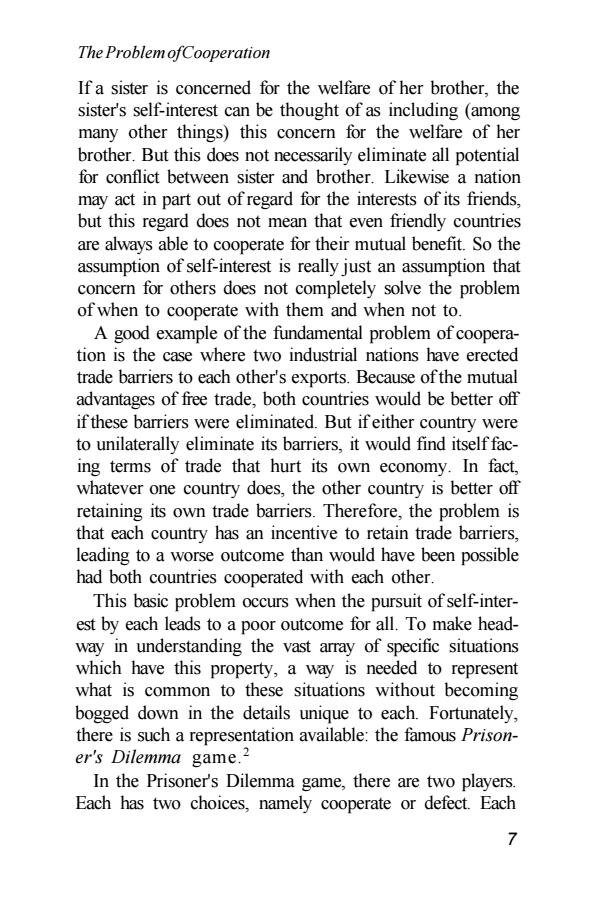正在加载图片...

The Problem ofCooperation If a sister is concerned for the welfare of her brother,the sister's self-interest can be thought of as including (among many other things)this concern for the welfare of her brother.But this does not necessarily eliminate all potential for conflict between sister and brother.Likewise a nation may act in part out of regard for the interests of its friends, but this regard does not mean that even friendly countries are always able to cooperate for their mutual benefit.So the assumption of self-interest is really just an assumption that concern for others does not completely solve the problem of when to cooperate with them and when not to. A good example of the fundamental problem of coopera- tion is the case where two industrial nations have erected trade barriers to each other's exports.Because ofthe mutual advantages of free trade,both countries would be better off if these barriers were eliminated.But ifeither country were to unilaterally eliminate its barriers,it would find itself fac- ing terms of trade that hurt its own economy.In fact, whatever one country does,the other country is better off retaining its own trade barriers.Therefore,the problem is that each country has an incentive to retain trade barriers, leading to a worse outcome than would have been possible had both countries cooperated with each other. This basic problem occurs when the pursuit of self-inter- est by each leads to a poor outcome for all.To make head- way in understanding the vast array of specific situations which have this property,a way is needed to represent what is common to these situations without becoming bogged down in the details unique to each.Fortunately, there is such a representation available:the famous Prison- er's Dilemma game.2 In the Prisoner's Dilemma game,there are two players. Each has two choices,namely cooperate or defect.Each 7The Problem of Cooperation If a sister is concerned for the welfare of her brother, the sister's self-interest can be thought of as including (among many other things) this concern for the welfare of her brother. But this does not necessarily eliminate all potential for conflict between sister and brother. Likewise a nation may act in part out of regard for the interests of its friends, but this regard does not mean that even friendly countries are always able to cooperate for their mutual benefit. So the assumption of self-interest is really just an assumption that concern for others does not completely solve the problem of when to cooperate with them and when not to. A good example of the fundamental problem of cooperation is the case where two industrial nations have erected trade barriers to each other's exports. Because of the mutual advantages of free trade, both countries would be better off if these barriers were eliminated. But if either country were to unilaterally eliminate its barriers, it would find itself facing terms of trade that hurt its own economy. In fact, whatever one country does, the other country is better off retaining its own trade barriers. Therefore, the problem is that each country has an incentive to retain trade barriers, leading to a worse outcome than would have been possible had both countries cooperated with each other. This basic problem occurs when the pursuit of self-interest by each leads to a poor outcome for all. To make headway in understanding the vast array of specific situations which have this property, a way is needed to represent what is common to these situations without becoming bogged down in the details unique to each. Fortunately, there is such a representation available: the famous Prisoner's Dilemma game.2 In the Prisoner's Dilemma game, there are two players. Each has two choices, namely cooperate or defect. Each 7